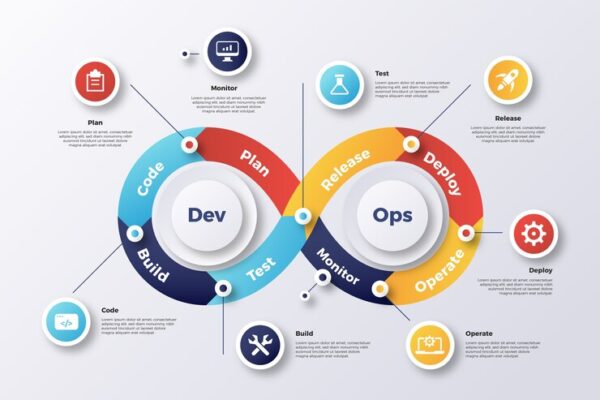Course Overview
The “Diploma in Java with DevOps” is an advanced three-month program designed to build on the foundational knowledge from the “Certificate in Java Programming” course. This program provides in-depth training in advanced Java programming concepts. It integrates essential DevOps practices to equip learners with the skills needed to develop, deploy, and maintain Java applications in a modern DevOps environment. The course is structured into detailed modules focusing on critical aspects of advanced Java development and DevOps practices.
Course Structure
Duration: 3 months
Sessions per week: 3
Hours per session: 2
Total hours: 72
Module 1: Advanced Java Programming (14 hours)
Session 1: Advanced Java Concepts
Multithreading and concurrency
Using the java.util.concurrent package
Session 2: Java Streams API
Understanding streams in Java
Using streams for data processing
Session 3: Java Networking
Understanding network programming in Java
Implementing client-server applications
Session 4: Advanced File I/O
Using NIO (New Input/Output) for high-performance I/O
File channel and buffer operations
Session 5: Hands-On Project: Developing an Advanced Java Application
Applying advanced Java concepts to build a complete application
Debugging and testing the application
Module 2: Introduction to DevOps (10 hours)
Session 6: Overview of DevOps
Principles and practices of DevOps
Benefits of adopting DevOps
Session 7: Version Control with Git and GitHub
Using Git for version control
Collaboration with GitHub
Session 8: Continuous Integration (CI)
Introduction to CI/CD pipelines
Setting up CI with Jenkins
Session 9: Continuous Deployment (CD)
Automated deployment processes
Using Docker for containerisation
Session 10: Hands-On Project: Setting Up a CI/CD Pipeline
Implementing a CI/CD pipeline for a Java application
Deploying the application using Docker
Module 3: Building and Deploying Java Applications (14 hours)
Session 11: Build Automation with Maven
Introduction to Maven
Using Maven for project management and build automation
Session 12: Advanced Build Automation
Multi-module projects in Maven
Customising the build process with plugins
Session 13: Introduction to Spring Framework
Overview of Spring Framework
Setting up a Spring project
Session 14: Spring Boot
Creating Spring Boot applications
Using Spring Boot for Rapid Development
Session 15: Hands-On Project: Building and Deploying a Spring Boot Application
Developing a Spring Boot application
Deploying the application using Maven and Docker
Module 4: Cloud Deployment and Monitoring (12 hours)
Session 16: Introduction to Cloud Computing
Overview of cloud platforms (AWS, Azure, Google Cloud)
Benefits of cloud deployment
Session 17: Deploying Java Applications to the Cloud
Using AWS Elastic Beanstalk for deployment
Using Azure App Service for deployment
Session 18: Monitoring and Logging
Introduction to monitoring tools (Prometheus, Grafana)
Implementing logging with Logback and Logstash
Session 19: Hands-On Project: Cloud Deployment and Monitoring
Deploying a Java application to the cloud
Setting up monitoring and logging
Module 5: Security and Testing (12 hours)
Session 20: Securing Java Applications
Understanding security best practices
Implementing authentication and authorisation
Session 21: Secure Coding Practices
Preventing common vulnerabilities (SQL injection, XSS)
Using secure coding guidelines
Session 22: Automated Testing
Introduction to automated testing with JUnit
Writing unit tests and integration tests
Session 23: Test-Driven Development (TDD)
Principles of TDD
Developing Java applications using TDD
Session 24: Hands-On Project: Secure and Test-Driven Java Application
Implementing security and testing best practices
Developing a secure and test-driven Java application
Module 6: Capstone Project and Professional Development (10 hours)
Session 25: Project Planning and Design
Selecting a project topic
Planning and designing the project
Session 26: Project Development
Implementing the project
Integrating advanced Java and DevOps concepts
Session 27: Project Development (continued)
Debugging and testing the project
Preparing for presentation
Session 28: Project Presentation and Review
Presenting the project to peers and instructors
Receiving feedback and making improvements
Session 29: Career Development and Networking
Job search strategies and networking
Preparing for technical interviews
Conclusion
The “Diploma in Java with DevOps” program is designed to provide a comprehensive and advanced understanding of Java programming and DevOps practices. Through a blend of theoretical knowledge and practical experience, learners will not only develop the skills needed to develop, deploy, and maintain professional-quality Java applications in a modern DevOps environment, but also gain a deep understanding of the underlying principles and concepts.
By the end of the course, participants will be well-equipped to tackle real-world Java development challenges and advance their careers in software development and DevOps, feeling knowledgeable and competent in their field.
Join us at CTTI and embark on a transformative journey to mastering Java programming with DevOps.


Reviews
There are no reviews yet.